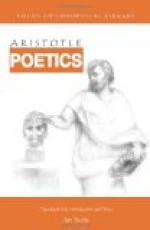As for the metre, the heroic measure has proved its fitness by the test of experience. If a narrative poem in any other metre or in many metres were now composed, it would be found incongruous. For of all measures the heroic is the stateliest and the most massive; and hence it most readily admits rare words and metaphors, which is another point in which the narrative form of imitation stands alone. On the other hand, the iambic and the trochaic tetrameter are stirring measures, the latter being akin to dancing, the former expressive of action. Still more absurd would it be to mix together different metres, as was done by Chaeremon. Hence no one has ever composed a poem on a great scale in any other than heroic verse. Nature herself, as we have said, teaches the choice of the proper measure.
Homer, admirable in all respects, has the special merit of being the only poet who rightly appreciates the part he should take himself. The poet should speak as little as possible in his own person, for it is not this that makes him an imitator. Other poets appear themselves upon the scene throughout, and imitate but little and rarely. Homer, after a few prefatory words, at once brings in a man, or woman, or other personage; none of them wanting in characteristic qualities, but each with a character of his own.
The element of the wonderful is required in Tragedy. The irrational, on which the wonderful depends for its chief effects, has wider scope in Epic poetry, because there the person acting is not seen. Thus, the pursuit of Hector would be ludicrous if placed upon the stage—the Greeks standing still and not joining in the pursuit, and Achilles waving them back. But in the Epic poem the absurdity passes unnoticed. Now the wonderful is pleasing: as may be inferred from the fact that every one tells a story with some addition of his own, knowing that his hearers like it. It is Homer who has chiefly taught other poets the art of telling lies skilfully. The secret of it lies in a fallacy, For, assuming that if one thing is or becomes, a second is or becomes, men imagine that, if the second is, the first likewise is or becomes. But this is a false inference. Hence, where the first thing is untrue, it is quite unnecessary, provided the second be true, to add that the first is or has become. For the mind, knowing the second to be true, falsely infers the truth of the first. There is an example of this in the Bath Scene of the Odyssey.
Accordingly, the poet should prefer probable impossibilities to improbable possibilities. The tragic plot must not be composed of irrational parts. Everything irrational should, if possible, be excluded; or, at all events, it should lie outside the action of the play (as, in the Oedipus, the hero’s ignorance as to the manner of Laius’ death); not within the drama,—as in the Electra, the messenger’s account of the Pythian games; or, as in the Mysians, the man who has come from Tegea to Mysia and is still




